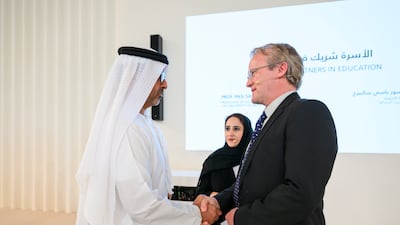There has been a steady decline in the role of schools in children's education over the past 25 years, a leading expert said.
The changing landscape means children currently learn most knowledge and skills from media and digital technology, said Pasi Sahlberg, an author and professor of educational leadership at the University of Melbourne.
He spoke at the Majlis Mohamed bin Zayed in Abu Dhabi this week in a lecture titled Parents as Partners in Education.
Prof Sahlberg said it was crucial for parents to play an active role in their children’s education.
“Students today can acquire most of the knowledge and skills that were once exclusively taught in schools through alternative means, such as media and digital technologies," he said.
In many countries, informal learning outside traditional school hours has become an integral part of education.
"Students can increasingly earn credits for independently acquiring knowledge and skills recognised by their schools and education authorities," Prof Sahlberg said.
The change has also widened the disparity in educational outcomes between children from lower and higher-income families, he said.
New digital frontier
“Research conducted in Australia and Canada has revealed varying parental approaches to their children's use of digital media and technologies, influenced by socioeconomic circumstances," Prof Sahlberg said.
“In Australia, on average one third of parents permit their children to bring smartphones to bed every night, with this percentage rising to half in lower-income families.
"Students struggling in school are most likely to take their digital devices to bed with them every night.”
He said parents should become more involved in their child's education, rather than confiscating their digital devices.
He also said schools have put more focus on children's well-being and mental health.
“It takes a village to raise a child,” he said.
“The nature of school education is rapidly changing due to an uncertain world.
"While strengthening partnerships between parents and teachers, it is important to remember that schools alone can’t figure out what the future of schooling looks like.
"New kinds of partnerships between parents, schools and the community are needed to make sure all children everywhere have the best possible education. They must thrive and prosper in the future.”
He was speaking in the latest Majlis Mohamed bin Zayed, which regularly hosts prominent figures, including renowned authors, scientists and educators.
Paraphrasing a famous quote from former US president John F Kennedy, Prof Sahlberg said: “Ask not what your school can do for you, but what you can do for your school."
He said schools were traditionally responsible for giving children "knowledge and skills necessary for a good education and a prosperous life".
"Not long ago, schools were the primary places where youngsters acquired the knowledge required to succeed in the future," he said.
"During that era, parents played a crucial role in their children's overall education, including instilling values, shaping behaviour, promoting health and teaching various life skills for daily living.”















